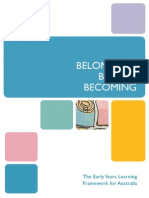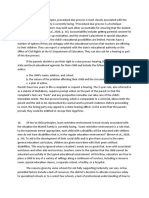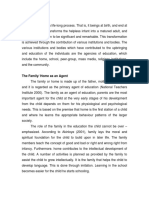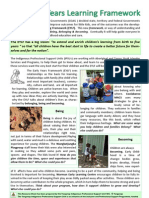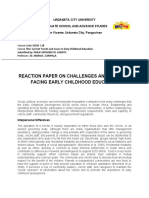REACTION PAPER On Early Childhood Education in The Philippines (4) Sample Program of ECE Activities, (5) Benefits of ECE
REACTION PAPER On Early Childhood Education in The Philippines (4) Sample Program of ECE Activities, (5) Benefits of ECE
Uploaded by
Philip Anthony Marcos CabatoCopyright:
Available Formats
REACTION PAPER On Early Childhood Education in The Philippines (4) Sample Program of ECE Activities, (5) Benefits of ECE
REACTION PAPER On Early Childhood Education in The Philippines (4) Sample Program of ECE Activities, (5) Benefits of ECE
Uploaded by
Philip Anthony Marcos CabatoOriginal Description:
Original Title
Copyright
Available Formats
Share this document
Did you find this document useful?
Is this content inappropriate?
Copyright:
Available Formats
REACTION PAPER On Early Childhood Education in The Philippines (4) Sample Program of ECE Activities, (5) Benefits of ECE
REACTION PAPER On Early Childhood Education in The Philippines (4) Sample Program of ECE Activities, (5) Benefits of ECE
Uploaded by
Philip Anthony Marcos CabatoCopyright:
Available Formats
URDANETA CITY UNIVERSITY
GRADUATE SCHOOL AND ADVANCE STUDIES
San Vicente, Urdaneta City, Pangasinan
Course Code: ECEM 118
Course Title: Current Trends and Issues in Early Childhood Education
Submitted by: PHILIP ANTHONY M. CABATO
Professor : Dr. MARIO E. CAMPILLA
REACTION PAPER ON Early Childhood Education in the
Philippines (4) Sample Program of ECE Activities, (5) Benefits of
ECE
Going to kindergarten is an important step for you, and your child. Kindergarten
provides children with life skills and opportunities to be successful in all developmental
areas, setting a strong foundation for their educational journey.
Kindergarten provides experiences for children to grow and develop through play and
interaction. It also allows children to become confident learners in a safe and supported
environment, providing a framework of belonging, being and becoming.
Kindergarten expands children’s knowledge and connection of themselves,
family,culture, their environment and the broader community.
Kindergarten programs are designed to expand your child’s development in key areas.
Children have a strong sense of identity by becoming independent, and are
provided with opportunities to explore their feelings and relationships with others.
Children are connected with, and contribute, to their world, by learning
about their environment, cultures and heritage of others.
Children have a strong sense of wellbeing by being involved in physical
activity, learning practice and resilience and being provided with opportunities to
strengthen decision-making skills.
Children are confident and involved learners where they are challenged and
inspired to investigate and explore.
Children are effective communicators where children are immersed and
involved in language with a range of contexts and materials.
Play is essential to development because it contributes to the cognitive, physical, social, and
emotional well-being of children and youth. Play also offers an ideal opportunity for parents to
engage fully with their children. Despite the benefits derived from play for both children and parents,
time for free play has been markedly reduced for some children. This report addresses a variety of
factors that have reduced play, including a hurried lifestyle, changes in family structure, and
increased attention to academics and enrichment activities at the expense of recess or free child-
centered play. This report offers guidelines on how pediatricians can advocate for children by
helping families, school systems, and communities consider how best to ensure that play is
protected as they seek the balance in children’s lives to create the optimal developmental milieu.
Play is so important to optimal child development that it has been recognized by the United Nations
High Commission for Human Rights as a right of every child. 1 This birthright is challenged by forces
including child labor and exploitation practices, war and neighborhood violence, and the limited
resources available to children living in poverty. However, even those children who are fortunate
enough to have abundant available resources and who live in relative peace may not be receiving
the full benefits of play. Many of these children are being raised in an increasingly hurried and
pressured style that may limit the protective benefits they would gain from child-driven play. Because
every child deserves the opportunity to develop to their unique potential, child advocates must
consider all factors that interfere with optimal development and press for circumstances that allow
each child to fully reap the advantages associated with play.
You might also like
- About Limerence A Guide To LimerenceDocument90 pagesAbout Limerence A Guide To Limerenceottuser100% (1)
- Teaching GuideDocument385 pagesTeaching GuideengrjeodyNo ratings yet
- Ece My EditDocument12 pagesEce My Editruthamerika6No ratings yet
- A4 Ece26 (Pepino)Document2 pagesA4 Ece26 (Pepino)Cherry Ann GabihanNo ratings yet
- Pediatrics 2008 High E1008 15Document10 pagesPediatrics 2008 High E1008 15Nanda Asyura RizkyaniNo ratings yet
- 1 Eylf Early Years Learning FrameworkDocument49 pages1 Eylf Early Years Learning Frameworkapi-242756158No ratings yet
- Elelia Pdge WorkDocument32 pagesElelia Pdge WorkNewtonNo ratings yet
- Chapter OneDocument30 pagesChapter OneJuvelyn Teves MunalemNo ratings yet
- Children'S Learning in The Early Childhood PhaseDocument5 pagesChildren'S Learning in The Early Childhood Phasealvin n. vedarozagaNo ratings yet
- Quality EducationDocument9 pagesQuality EducationArun Kumar SinghNo ratings yet
- RNK 1309Document6 pagesRNK 1309cyclop910No ratings yet
- 2p-Eced06 (Task 4)Document5 pages2p-Eced06 (Task 4)Mariefe DelosoNo ratings yet
- Educational IssuesDocument14 pagesEducational Issuesjoreina ramosNo ratings yet
- Early Years Learning FrameworkDocument47 pagesEarly Years Learning FrameworkdareosikoyaNo ratings yet
- Empowering Parents & Teachers: How Parents and Teachers Can Develop Collaborative PartnershipsFrom EverandEmpowering Parents & Teachers: How Parents and Teachers Can Develop Collaborative PartnershipsNo ratings yet
- All UnitDocument99 pagesAll Unitakshay.ukprinceNo ratings yet
- Barnardos-Quality Early Years Care And-EducationDocument43 pagesBarnardos-Quality Early Years Care And-EducationZhang YolandaNo ratings yet
- Advocacy - Social Emotional DevDocument12 pagesAdvocacy - Social Emotional Devapi-349448402No ratings yet
- Problem Identification and The Cause of The Problems: Objectives To Be AchievedDocument3 pagesProblem Identification and The Cause of The Problems: Objectives To Be AchievedAnurag PatelNo ratings yet
- Elementos para El Análisis de La NiñezDocument2 pagesElementos para El Análisis de La Niñezjuan.ruaNo ratings yet
- The Whole Child Approach and How It Affects StudentsDocument7 pagesThe Whole Child Approach and How It Affects StudentsShella Mae Maquiran ManatNo ratings yet
- Belonging, Being and Becoming PDFDocument47 pagesBelonging, Being and Becoming PDFShailendra SinhaNo ratings yet
- Unicef Vanessa Tobin Endorsement For I Am Sam Foundation Teacher Sam Rayla Melchor SantosDocument6 pagesUnicef Vanessa Tobin Endorsement For I Am Sam Foundation Teacher Sam Rayla Melchor SantosraylamelchorsantosNo ratings yet
- Educ 1 Activity 1Document5 pagesEduc 1 Activity 1Peter CampilanNo ratings yet
- The Concept of Child Friendly SchoolDocument23 pagesThe Concept of Child Friendly SchoolJussa Leilady AlberbaNo ratings yet
- United States Bank Street Janns Marinel Flores 703Document5 pagesUnited States Bank Street Janns Marinel Flores 703Carmeli VillavicencioNo ratings yet
- Kadewole G&C Parental Involvement On Child Behaviour ProjDocument35 pagesKadewole G&C Parental Involvement On Child Behaviour ProjOmobomi SmartNo ratings yet
- Ecd 400 Signature AssignmentDocument7 pagesEcd 400 Signature Assignmentapi-326311209No ratings yet
- MA2Document5 pagesMA2LauraNo ratings yet
- Implication of Development To Learning May 23, 2020Document6 pagesImplication of Development To Learning May 23, 2020Mary Grace JimenezNo ratings yet
- 2p-Review of DapDocument10 pages2p-Review of DapDess DotimasNo ratings yet
- Edf 160Document4 pagesEdf 160Asogwa Michael. IloabuchiNo ratings yet
- Chapter 8: Jean Piaget On Cognitive DevelopmentDocument3 pagesChapter 8: Jean Piaget On Cognitive DevelopmentErine DelfinNo ratings yet
- Diversity & Management in ECCE Chapters Four and FiveDocument13 pagesDiversity & Management in ECCE Chapters Four and FiveEskindir JembereNo ratings yet
- Agencies of EducationDocument8 pagesAgencies of EducationSalamKhan100% (1)
- Presentation 1Document12 pagesPresentation 1api-351330683No ratings yet
- RRL With CommentsDocument6 pagesRRL With Commentsfatima naranjoNo ratings yet
- School Education and Family Education.Document7 pagesSchool Education and Family Education.nikiemalawal6No ratings yet
- ECCE Notes PDFDocument11 pagesECCE Notes PDFshafNo ratings yet
- Child Friendly SchoolsDocument10 pagesChild Friendly Schoolsquraishiomar001No ratings yet
- Department of Education For Pre-SchoolDocument32 pagesDepartment of Education For Pre-Schoollaren100% (1)
- Parent School ConnectionDocument18 pagesParent School Connectionapi-261107205No ratings yet
- Teaching and Learning in Nature: Let's Go Outside!Document2 pagesTeaching and Learning in Nature: Let's Go Outside!simonettixNo ratings yet
- Children Dev and Construction PaperDocument6 pagesChildren Dev and Construction PapersydneyNo ratings yet
- Different Interventions in Pre School EducationDocument15 pagesDifferent Interventions in Pre School EducationEric D. ValleNo ratings yet
- Agencies of Education.Document4 pagesAgencies of Education.F. Lalrampari Rollno1No ratings yet
- Child Friendly School SurveyDocument27 pagesChild Friendly School SurveyWindel Beth Quimat ZafraNo ratings yet
- Critique PaperDocument20 pagesCritique PaperDanielle Grace Cavan BagongonNo ratings yet
- Community Development ProjectDocument18 pagesCommunity Development Projectsaivenkent756No ratings yet
- PRTM Play Coalition White PaperDocument8 pagesPRTM Play Coalition White Paperapi-471159314No ratings yet
- RevisedChap 1 5 PLAYDocument53 pagesRevisedChap 1 5 PLAYUnknown UserNo ratings yet
- Earlychildhood DEDocument7 pagesEarlychildhood DErita nsamyaNo ratings yet
- Inclusion and Diversity in the Early Years: A practical resource to support inclusive practice in early years settingsFrom EverandInclusion and Diversity in the Early Years: A practical resource to support inclusive practice in early years settingsRating: 5 out of 5 stars5/5 (1)
- 2shn Programme GuidanceDocument51 pages2shn Programme GuidanceStella GašparušNo ratings yet
- The Effects of The EnvironmentDocument4 pagesThe Effects of The EnvironmentJimron Brix AlcalaNo ratings yet
- Management Strategies For Children With Special Needs in Early YearsDocument8 pagesManagement Strategies For Children With Special Needs in Early YearsGlobal Research and Development ServicesNo ratings yet
- Wesleyan University-Philippines A Methodist Autonomous UniversityDocument2 pagesWesleyan University-Philippines A Methodist Autonomous UniversitySan Eustacio Elementary SchoolNo ratings yet
- Parent PresentationDocument16 pagesParent Presentationapi-258174505No ratings yet
- Benefit From InclusionDocument25 pagesBenefit From InclusionKashif SaeedNo ratings yet
- Early Years Learning Framework ResourceDocument4 pagesEarly Years Learning Framework ResourceNoureen AnsariNo ratings yet
- Suggestion BoxDocument1 pageSuggestion BoxPhilip Anthony Marcos CabatoNo ratings yet
- Reaction Paper On Challenges and Issues in Facing Early Childhood EducationDocument3 pagesReaction Paper On Challenges and Issues in Facing Early Childhood EducationPhilip Anthony Marcos CabatoNo ratings yet
- Reaction Paper On Legal Framework For Early Childhood Governance in The PhilippinesDocument2 pagesReaction Paper On Legal Framework For Early Childhood Governance in The PhilippinesPhilip Anthony Marcos CabatoNo ratings yet
- REACTION PAPER On Early Childhood Education in The Philippines (1) Objectives and Aims, (2) Curriculum, Content and Pedagogy of ECE Porgram, (3) Teaching Methods and StrategiesDocument2 pagesREACTION PAPER On Early Childhood Education in The Philippines (1) Objectives and Aims, (2) Curriculum, Content and Pedagogy of ECE Porgram, (3) Teaching Methods and StrategiesPhilip Anthony Marcos CabatoNo ratings yet
- Literacy InstructionDocument3 pagesLiteracy InstructionPhilip Anthony Marcos CabatoNo ratings yet
- Reaction Paper On Popular Education Trends in Ece (5) Virtual Learning, (6) Video-Based Learning, (7) Slef-Care, (8) Blended LearningDocument3 pagesReaction Paper On Popular Education Trends in Ece (5) Virtual Learning, (6) Video-Based Learning, (7) Slef-Care, (8) Blended LearningPhilip Anthony Marcos CabatoNo ratings yet
- Title: Government Elementary School Profile, Sy 2019-2020Document10 pagesTitle: Government Elementary School Profile, Sy 2019-2020Philip Anthony Marcos CabatoNo ratings yet
- Reaction Paper On National Kindergarten Curriculum GuideDocument2 pagesReaction Paper On National Kindergarten Curriculum GuidePhilip Anthony Marcos CabatoNo ratings yet
- Reaction Paper 10157Document1 pageReaction Paper 10157Philip Anthony Marcos CabatoNo ratings yet
- (D) Anecdotal RecordDocument11 pages(D) Anecdotal RecordPhilip Anthony Marcos Cabato100% (3)
- (D) Bloom - S TaxonomyDocument8 pages(D) Bloom - S TaxonomyPhilip Anthony Marcos CabatoNo ratings yet
- Graphic Organizers FinalDocument45 pagesGraphic Organizers FinalPhilip Anthony Marcos Cabato0% (1)
- Unit 2 PPM PDFDocument26 pagesUnit 2 PPM PDFutsav mishraNo ratings yet
- MSDS OctapolDocument8 pagesMSDS OctapolAntonio CardosoNo ratings yet
- Stability of Buildings Part 3Document64 pagesStability of Buildings Part 3muhannedNo ratings yet
- "Strive To Enter Through The Narrow Door" (Outline)Document2 pages"Strive To Enter Through The Narrow Door" (Outline)TimmNo ratings yet
- Salalah LPG Project Contract No.: SLPG/08/2015 Petrofac Job No.: JI-2033Document7 pagesSalalah LPG Project Contract No.: SLPG/08/2015 Petrofac Job No.: JI-2033Ashraf MohammedNo ratings yet
- The Labour Proclamation NoDocument15 pagesThe Labour Proclamation NoSosi SissayNo ratings yet
- The Political Ideas of The PuritansDocument29 pagesThe Political Ideas of The PuritansPaulo Ricardo Dias FerreiraNo ratings yet
- FRACTALI AEE (Air, Earth, Earth) She Is Born From The Air of Consciousness and Duplicates Herself Within The Largest To The Smallest FormDocument4 pagesFRACTALI AEE (Air, Earth, Earth) She Is Born From The Air of Consciousness and Duplicates Herself Within The Largest To The Smallest Formliaya76No ratings yet
- The Haunting of Bly Manor: Best of 2020Document10 pagesThe Haunting of Bly Manor: Best of 2020Madoline PlattenbergNo ratings yet
- Goal of E-BusinessDocument6 pagesGoal of E-Businessvarsha raichalNo ratings yet
- Unit 8 - CELEBRATIONS - Image.MarkedDocument11 pagesUnit 8 - CELEBRATIONS - Image.MarkednhiNo ratings yet
- Unit 4 PlasticsDocument2 pagesUnit 4 PlasticsSet S. Pirath0% (1)
- Why Culture Has Come To A Standstill - The New York TimesDocument5 pagesWhy Culture Has Come To A Standstill - The New York TimesCHrisNo ratings yet
- Suman Sahu, Et AlDocument10 pagesSuman Sahu, Et AlJatin SinghNo ratings yet
- Project Report Dary FarmDocument7 pagesProject Report Dary FarmAbdul Hakim ShaikhNo ratings yet
- Resume WirtzDocument2 pagesResume Wirtzapi-454188719No ratings yet
- Reactivos Pictus 700Document4 pagesReactivos Pictus 700Marco Antonio Sandoval NinaNo ratings yet
- Thumb RulesDocument6 pagesThumb Ruleskvm2020No ratings yet
- Creative Platforms - Unit HandbookDocument17 pagesCreative Platforms - Unit Handbookdphotoportsmouth100% (1)
- Grammar: Articles A, An, TheDocument34 pagesGrammar: Articles A, An, TheMaria Beatriz SouzaNo ratings yet
- Bansal BillDocument1 pageBansal Billwanna.wohNo ratings yet
- Manpower Complement 1st Quarter CY 2021Document2 pagesManpower Complement 1st Quarter CY 2021Jake RoscoNo ratings yet
- ELT 1 Module 1Document4 pagesELT 1 Module 1Kristine CantileroNo ratings yet
- Hanna Yo TecnoDocument5 pagesHanna Yo TecnoMANUEL ALEJANDRO JUAREZ MOLINANo ratings yet
- Ethics CT II Answer Key 20.9.18Document2 pagesEthics CT II Answer Key 20.9.18Mr Ravi SivaprakashNo ratings yet
- Eo M331.01Document30 pagesEo M331.01EknoorNo ratings yet
- Ninja: Jump To Navigation Jump To SearchDocument35 pagesNinja: Jump To Navigation Jump To SearchJorge Charlie CáceresNo ratings yet
- Biography of John Sung LyallDocument229 pagesBiography of John Sung LyallNelly NEGLONo ratings yet
- 1973 Samadhi ExperimentDocument3 pages1973 Samadhi ExperimentRitesh AgarwalNo ratings yet













